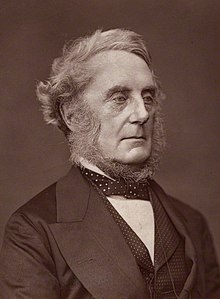Edward Cardwell, 1st Viscount Cardwell

Edward Cardwell, 1st Viscount Cardwell PC FRS (born July 24, 1813 in Liverpool , † February 15, 1886 in Torquay , Devon, England) was a British politician . As Minister of War (1868 to 1874), he initiated extensive reforms in the British Army.
Life
Cardwell was born the son of the Liverpool merchant John Cardwell and his wife Elizabeth. He attended Winchester College and then studied at Balliol College , Oxford , where he graduated in 1835. He was inducted into the Inner Temple Bar Association and first worked as a lawyer.
He soon discovered his interest in politics and in 1842 became a Conservative Party MP in the House of Commons for the Clitheroe constituency in Lancashire after Whig candidate Mathew Wilson's narrow electoral victory was invalidated. He became a supporter of the Conservative Prime Minister Sir Robert Peel and under him obtained his first office as Financial Secretary to the Treasury between 1845 and 1846. In 1852 Lord Aberdeen made what he remained as President of the Board of Trade until 1855. In 1854 he brought the Cardwell Railway Act through Parliament, which regulated private competition among railway companies.
During this time Cardwell changed his constituencies again and again. In 1847 he was elected for Liverpool , this seat he lost to William Forbes Mackenzie in 1852 , but was elected to succeed William Wood for Oxford . In 1858 he lost his seat for Oxford, but won the by-election. He moved to the Liberal camp in 1859 and became Chief Secretary for Ireland in Palmerston's cabinet . Dissatisfied with this post, he changed office two years later and became Chancellor of the Duchy of Lancaster . In 1864 he received another office and became Secretary of State for the Colonies , which he remained until the change of government in 1866.
When the Liberals returned to government under William Ewart Gladstone in 1868 , Cardwell reached the climax of his career as British Secretary of War . During his six-year tenure, he initiated a series of much-needed reforms in the British Army . This included the introduction of uniform training standards for officers, including the abolition of the sale of officer positions . In the line infantry, the regiments, which in peacetime consisted mostly of only one battalion, were combined into those with two active battalions and a common recruiting area. The until then largely insignificant volunteer units became territorial battalions of the line regiments. Of the two active battalions, only one went overseas, so that in the event of heavy losses, these could be compensated without a complete reorganization of the regiment. Although traditionalists fought the so-called Cardwell reforms and their initiator massively, the innovations prevailed. It was only in the area of uniforms that some regiments were given back the peculiarities they had initially abolished in the course of the reforms.
After Gladstone's election defeat in 1874, he was promoted to Viscount Cardwell , of Ellerbeck in the County of Lancaster, and thus ended his active political career.
Lord Cardwell married Annie Parker, daughter of Charles Stuart Parker, in 1838. He died in February 1886. His wife survived him by a year and died in February 1887.
The city of Cardwell in Queensland , Australia was named after him.
literature
- Goldwin Smith: Cardwell, Edward (1813-1886) . In: Leslie Stephen (Ed.): Dictionary of National Biography . Volume 9: Canute - Chaloner. , MacMillan & Co, Smith, Elder & Co., New York City / London 1887, pp. 43 - 45 (English).
- Brian Bond: Cardwell, Edward, first Viscount Cardwell (1813-1886). In: Henry Colin Gray Matthew, Brian Harrison (Eds.): Oxford Dictionary of National Biography , from the earliest times to the year 2000 (ODNB). Oxford University Press, Oxford 2004, ISBN 0-19-861411-X , ( oxforddnb.com license required ), as of May 2009
- Bell AG: Cardwell, Edward (1813-1886) . In: Douglas Pike: Australian Dictionary of Biography . Volume 3, Melbourne University Press, London 1969, ISBN 0-522-85382-X (English)
- Cardwell, Edward, Lord . In: Meyers Großes Konversations-Lexikon . 6th edition. Volume 3, Bibliographisches Institut, Leipzig / Vienna 1905, p. 760 .
Web links
- Mr Edward Cardwell at Hansard (English)
- Entry in The National Archives
Individual evidence
- ^ A b Edward Cardwell, 1st and last Viscount Cardwell of Ellerbeck on thepeerage.com
- ↑ Cardwell's Army Reforms 1870-1881
- ↑ Cardwell's Army Reforms 1870--1881 on Victorian web
| predecessor | Office | successor |
|---|---|---|
| George Clerk |
Financial Secretary to the Treasury 1845-1846 |
John Parker |
| JW Henley | President of the Board of Trade 1852–1855 |
Edward Stanley |
| Richard Bourke |
Chief Secretary for Ireland 1859–1861 |
Robert Peel |
| George Gray |
Chancellor of the Duchy of Lancaster 1861-1864 |
George Villiers |
| Henry Pelham-Clinton |
Secretary of State for the Colonies 1864-1866 |
Henry Herbert |
| John Pakington |
Secretary of State for War 1868-1874 |
Gathorne Gathorne-Hardy |
| personal data | |
|---|---|
| SURNAME | Cardwell, Edward, 1st Viscount Cardwell |
| ALTERNATIVE NAMES | Cardwell, Edward |
| BRIEF DESCRIPTION | British politician, member of the House of Commons |
| DATE OF BIRTH | July 24, 1813 |
| PLACE OF BIRTH | Liverpool |
| DATE OF DEATH | February 15, 1886 |
| Place of death | Torquay , Devon, England |
